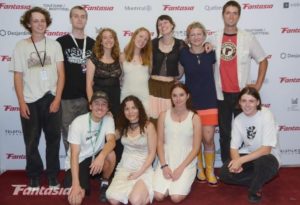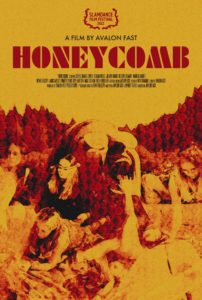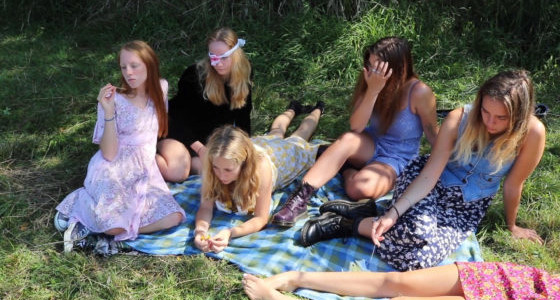This year’s Fantasia International Film Festival presented many impressive and thought-provoking films from an inspiring array of young talent. One such film was Avalon Fast’s dreamy, lo-fi enigma, HONEYCOMB. Shot in Fast’s British Columbia backyard with her teenage friends’ immense support and help, HONEYCOMB plays out like a feminine twist on LORD OF THE FLIES via Harmony Korine.
Saturated with sun-soaked hues and teenage angst, HONEYCOMB is a rare cinematic experience that effectively captures youth’s beauty and horror. Part of what sells this amorphous feeling is the raw authenticity of the film’s universally young cast and crew. United by their friendship and willingness to assist Fast achieve her dream, their earnest participation imparts a youthful honesty that simply can’t be bought or compelled.
One of HONEYCOMB’s young talents is Max Graham. A longtime friend of Fast, Graham contributed his skills both behind the camera and in front of it. On top of playing the role of Jude in the film, Graham also stepped up to the plate and became the film’s composer. Atmospheric, eerie, and evocative, Graham’s music is a perfect partner to Fast’s engrossing summer story.
Despite dabbling with music on and off over the years, HONEYCOMB is Graham’s first endeavor into the film scoring world. As a monumental moment in any composer’s career, this rare opportunity to speak with budding talent was simply too good to pass up. Funny enough, this was also his first interview ever! Throughout our conversation, we talked about working with Fast, his approach and process, acting alongside his friends, and what the experience taught him. Interviews don’t get much more endearing than this.

DG: Tell me a little bit about your background in music. Have you been playing music for a long time?
Max Graham: It really sort of started out around HONEYCOMB. When I was coming into high school, I was playing a bit of the guitar, and I had a computer with software on it. Avalon needed some music done, so I just tried to do it as best I could. I don’t want to say I didn’t have a musical background at the time, but I was definitely new to music. This was me really coming to music, I guess.
That’s super impressive! Avalon is your personal friend, but how did you become involved with HONEYCOMB? What appealed to you about stepping in as the composer?
So, there’s Henri and Avalon. Avalon is the director, and Henri played P.J. and was a huge part of the development of the film. Henri is also my brother, so that was a big part of why I was around. And, I’m also just friends with all of those people, so I was just kind of around.
I always wanted just to be able to make music and to have my music have a purpose, you know? And, this sort of felt like a good gateway for me to do that. It’s also a very experimental way to make music, so it opened my eyes a lot in that sense.
I bet. How involved was Avalon in helping shape the film’s musical direction? Did you two discuss that at all?
She was involved for sure, but she mostly left it up to me. It was mostly like, “Okay, Max. This is your job.” She wanted it to sound scary. And, for a lot of it, she would just tell me what the scene was, and then I would just try and do something that sounded like what the scene was like in my head.
That’s cool, though! You just had to vibe off of what was happening in the script?
Kinda. It was more that she’d be like, “Remember when we filmed this part? Try to pretend it’s a movie.” [Laughs]
Were there any films that influenced you with your music or any musicians or film scores that you turned to for inspiration?
Not as much films as music. I was on a weird psych-rock path when I was making that score. I was also into Aphex Twin at the time and stuff like that; 90s electronic a bit and some rock. It was weird, but that’s what made it feel like my own thing. I was like, “I’m not really making music that I would ever listen to or anything I’ve really heard before.” So, it felt good in that sense.
Tell me a little bit about your initial approach to tackling this project. What were the early stages like?
I actually started them with my friend Emmett [Roiko]. Avalon just wanted some background noise at first. Then Emmett and I would…we had this basement where we would do all of our band recording and stuff. We were just in there mic-ing things and making funny noises. After that, she was like, “I like this. This sounds cool.” And, we liked the idea of one person kind of handling all of it as opposed to a [few of us]. You know, when you’re a new filmmaker, it’s hard. You’re using like, royalty-free music. But we figured out that I could supply it, and it was basically just like that.
Did you discover anything interesting in that experimentation process or use any unexpected instruments or techniques?
Probably quite a few things, I think. We were basically just hunting the room for something. We had this little reverb percussion machine. It was like a little tube with a skin on one side that had a spring coming out of it. You shake it, and it sounds like thunder. That thing was pretty cool. There were also some parts where I was just snapping my fingers for some reason, just doing a weird finger snap thing. We even mic-ed the squeakiest chair in the room at one point. I remember trying to play the violin. That was a fun one. I butchered the violin so bad that it like, doesn’t even count as violin. [Laughs]
I mean, that’s classic horror right there!
Yeah! And then also a lot of sampling from old vinyl. We used old Japanese school recordings and comedy records as well. Those are sampled in the HONEYCOMB score. I just manipulated them, so they don’t sound like what they are anymore. It’s just more material that you can only get from [these records]. And no one else can do that unless they found the record and did exactly what I did. That was fun for me.
As this was your first time scoring a film, I’m sure you learned a lot. Talk about something you found a little bit more challenging but also something that you just had a lot of fun with.
I think that the most challenging part was…I didn’t know if I wanted to do it. Avalon, she had to obviously push some deadlines on me, and I was just kind of unsure if it was what I wanted to do or whatever. As far as making the music, the worst challenges I have are actually involved with the software I’m using, you know? Just getting lost in an error. That seems to be the worst of it for challenges. But it was fun. I felt like I could just do it when I wanted to. It was an escape. I got to just hunker down and kind of make it sound however I wanted to. It was just really fun to do that. It was also just different for me.
You also played the role of Jude in the film. What was it like handling double-duty and acting alongside some of your best friends?
It felt pretty natural. It was like, whoever could be there could be in the scene. And then, if I was at work, then someone else would just step in for me. They just needed a group of boys, and they needed a group of girls — we had both. And balancing the music and the acting wasn’t an issue. I made the score through the editing phase like, way after. After that summer, I guess. So it was fine.
We were all in such a small location all together anyways, and you’re working with your friends. I got to just work with the dudes. We just basically did what we do anyways. Avalon definitely got frustrated with us. [Laughs] Sometimes, there would be these parts where she’d be like, “Okay, boys. I just want you to banter in the background.” But we had to re-shoot the same scene so many times. We would just be talking way too loud and all this stuff. It was just fun. We could do it again, for sure.
I have to imagine that your involvement with the acting proved beneficial when it came time to score certain scenes. I mean, not too many composers get such intimate knowledge like that.
Yeah, exactly. It was like, “Do you remember when we shot this scene? Put music behind that scene. You were there, so set that mood.” My criteria was to make it scary. I was trying to do that. So, a lot of it is just like, deep chords [vocalizes heavy, low, pulsating tones].
And another thing was, I had to also make a really happy surf song. That was fun too. [Avalon] was just like, “Do the car scene! The car scene!” And, I know the car scene was them waving their hands out of the convertible. So I made this little jingle for it. It kind of sounds like a car commercial, almost. [Laughs]
So now that you have this first film under your belt, is film scoring something that you see yourself pursuing? What is your future with music?
I feel like I’ve learned a lot since HONEYCOMB. Like, I took music more and more seriously after HONEYCOMB. I don’t know how much I’m supposed to say, but I’m doing Avalon’s next movie too. That’s going to be like, everything. Because I’ve watched HONEYCOMB like, 30 times, and I know everything that I want to fix, and I want to change. I’ve learned from this, and I will be doing more of that. I want to continue playing in a band for a long time. Basically, I feel like I’m probably just going to work and try to make music forever.

HONEYCOMB made its Quebec premiere at the 2022 Fantasia International Film Festival.
Tags: Aphex Twin, Avalon Fast, Composer, Emmett Roiko, Fantasia Film Festival 2022, Film Festivals, Harmony Korine, Honeycomb, Interviews, Lord of the Flies, Max Graham



No Comments